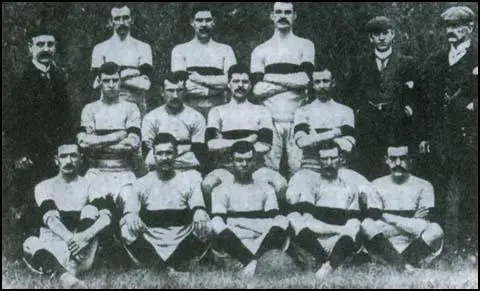The History of West Ham United
1901-1902
West Ham lost several of their best players at the end of the 1900-1901 season. James Reid left for Worksop Town whereas Freddie Fenton joined Swindon. The biggest blow of all was the club's longest-serving player, Charlie Dove, leaving for bitter rivals, Millwall.
However, at the beginning of the 1901-02 the Football League introduced a maximum wage of £4 per week. As some players had been earning as much as £10, they decided to join Southern League clubs where there were no restrictions on wages. As John Harding pointed out in For the Good of the Game: The Official History of the Professional Footballers' Association (1991) "In effect, the Football League abolished the free market where players' wages and conditions were concerned... there were 'escape routes' to clubs and countries where a player could ply his trade freely and earn a reasonable (indeed, where some Southern League clubs were concerned, highly lucrative) wage."
William Linward, an outside left, joined West Ham from Doncaster Rovers. Fred Griffiths was another recruit. Griffiths, 6ft 2ins and 15 stone, was one of the largest goalkeepers in football. He was also one of the best and in 1900 had played for Wales against both Scotland and England. West Ham also obtained a second goalkeeper, William Biggar from Sheffield United. It was Biggar who started off the season in goal.
West Ham also signed Peter Kyle, a very talented centre forward from Scotland. However, after only one league and two cup games he was involved in a straight swap for Welsh international defender William Jones from Kettering Town.
Despite the loss of several good players, West Ham won six of their first seven games. A local lad, James Bigden, a wing-half, looked a very promising prospect. Other local recruits, William Yenson and Dick Pudan also did well when they played. Billy Grassam continued the good form of the previous season and scored 7 goals in his first six games.
On 27th September, West Ham lost 5-1 to Wellingborough Town. As a result, Fred Griffiths replaced William Biggar as the club's first-team keeper. He held the position for the next two seasons.
West Ham played Millwall on 26th October, 1901. Over 9,000 people saw West Ham lose their first game of the season 2-0. The next visitors were Tottenham Hotspur who were also on a good run. This time 17,000 attended the game, a club record. West Ham lost 1-0. They also lost their next three games and ceased to become challengers for the league title.
In the FA Cup West Ham were drawn at home to Essex village side Grays. Tommy Moore, who had played for West Ham until being replaced by Hugh Monteith the previous season, played in goal for Grays that day. He saved an avalanche of shots from West Ham's potent forwards and was only beaten once during the game. Grays managed to score two and the Irons suffered their first ever "giant-killing".
West Ham made a late but could only finish 4th with 40 points. Portsmouth won the league with 47 points followed by Tottenham Hotspur and Southampton, who were both on 42. The Hammers had a good defensive record but only scored 45 goals during the season. The top scorers were Billy Grassam (10), George Radcliffe (10), Fred Corbett (6), Fergus Hunt (4), Roderick McEachrane (4) and William Linward (3).

